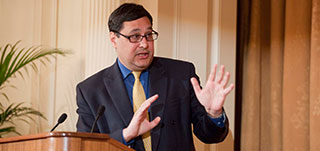Dean Adil Najam Presents at IDRC on Adaptation Economics
 Prof. Adil Najam, Dean of the Frederick S. Pardee School of Global Studies at Boston University, argues that we are now living in the ‘Age of [Climate] Adaptation.’ Importantly, he adds that a new ‘Adaptation Economics’ has emerged as a reality that developing countries have to confront and conform to.
Prof. Adil Najam, Dean of the Frederick S. Pardee School of Global Studies at Boston University, argues that we are now living in the ‘Age of [Climate] Adaptation.’ Importantly, he adds that a new ‘Adaptation Economics’ has emerged as a reality that developing countries have to confront and conform to.
His research suggests that while there are significant new costs for poor communities and poor countries in this new adaptation economics, there may also be some new gains and benefits to be had for those who use adaptation as an opportunity to improving their natural resource management practices.
Dean Adil Najam presented this argument in an invited lecture on his research on climate change adaptation at the International Development Research Center (IDRC) in Ottawa, Canada (May 30, 2015). The presentation was based on, but broadened the implications of a 3-year, multi-institutional research project on Climate Change Adaptation, Food Security and Water Security in Pakistan, that had been led by Dean Adil Najam.
Prof. Adil Najam was the principal investigator for the project which was funded by the International Development Research Center in Canada and for which Prof. Najam led a team of researchers at the Lahore University of Management Sciences (LUMS) and WWF-Pakistan. A key finding of this set of work is that over the next 25 years the cost of climate change to the Pakistani farmer is likely to be up to 8% of productivity but that good adaptation practices could result in a net productivity gain of up to 40+%.
In his recent presentation at the International Development Research Center (IDRC), Dean Najam contextualized these findings in the larger context of climate adaptation challenges for developing countries. He argued that “living in the age of adaptation” is imposing new costs and challenges on the poorest communities in the world, but it can sometimes also be an opportunity to fix lingering development mistakes: in particular, the mistakes of waste and ineffeciency.”